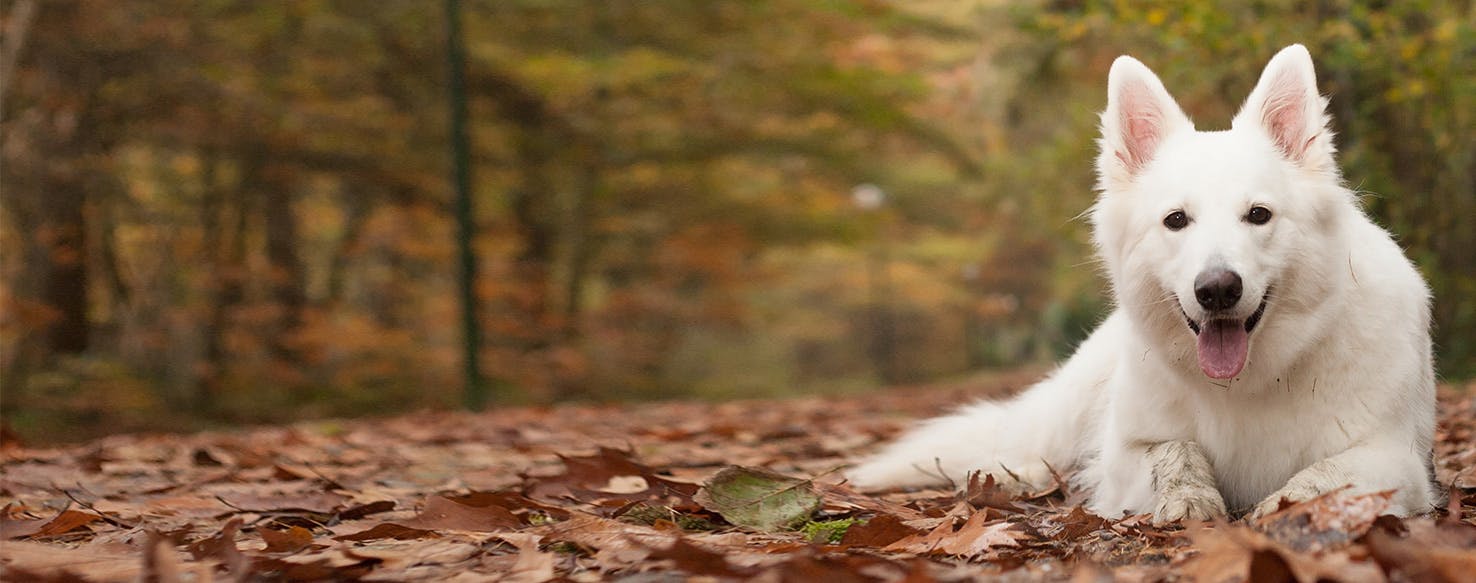- Home
- The Daily Wag!
- Behavior
- Why Do Dogs Make Noises When They Lay Down

Common
Irregular
Dogs make noises. It's what they do. Some of those noises are just plain cute, while others make owners wonder whether something is wrong. If your dog makes noises when he or she lies down, you may start to ask yourself if your furry friend might be in pain. The truth is, dogs grunt and groan when they lie down for a number of reasons. Sometimes it is normal, and sometimes there is actually something going on. The answer depends on your dog's age, health, and predisposition to making strange sounds, as well as the kind of noises that your dog is actually producing. Here are just a few options, based on what veterinarians know about canine vocalization.
If the noise your dog makes when he lies down is more of a grunt than a moan or groan, it is probably an expression of comfort. Even human beings grunt when they plop down in their favorite chairs at the end of the day, finally comfortable and relaxed. It may help to think of the noise as your dog's way of sighing with pleasure. The pleasure sigh is a common phenomenon in dogs. Their eyes begin to drift shut and they lay their head down, enjoying the feeling of contentment. Interestingly, though, if they act in the same way but their eyes stay open, they may be expressing disappointment. The context of the situation may also give you a clue as to which emotion the dog is feeling. After all, if you tell your dog it's not time to go out for a walk, he or she is unlikely to sigh contentedly. So, what if your dog is already lying down or even asleep when he or she starts to grunt? It may just be what naturally happens when the dog shifts positions, just like what happens when you shift around in the aforementioned favorite chair. If your dog is looking at you when he or she grunts, though, it may be a casual yet friendly “hello.” Happy to see you but comfortable, your dog gives you his or her version of a polite nod.
Grunting while asleep may also be an involuntary sound that goes along with your dog's breathing or shifting of position, although it may also be a sign that your dog is having a nightmare. There are some cases in which grunting or groaning while lying down may be a sign of pain. Young large-breed dogs often make noises as they get up and lie down because they are experiencing growing pains, which are benign and resolve with time. In older dogs, it may be a sign of arthritis or a condition known as canine ascites. This common and uncomfortable illness is characterized by the buildup of fluid in the abdomen and causes both digestive and respiratory upset.
Need advice about your pet's health?
Get answers fast from a veterinary professional 24/7 in the Wag! App.
Get Vet ChatIt can be cute when your dog grunts and groans like a little old man (or woman) when he or she lies down to sleep. Much of the time, there is no underlying problem and you can feel free to enjoy the cuteness. First, though, you need to figure out if something is medically wrong. You know your dog best, so start by carefully watching him or her while lying down or sleeping. If the dog is more vocal than normal, it may be time for a visit to the veterinarian. The vet can evaluate your dog to see if there is any respiratory or abdominal issues present. Both of these can have serious effects.
Ascites, for example, puts pressure on the abdominal organs and the lungs, so that it is very difficult for the dog to find a comfortable position. A more serious situation si when when this pressure leads to kidney or liver damage, congestive heart failure, or even the development of cancerous growths, which are more common when the dog with ascites is older. A veterinarian may be able to help help your dog to avoid these symptoms by finding the root cause of the ascites and identifying an appropriate treatment. Similarly, a veterinarian may be able to recommend palliative therapies for arthritis or growing pains. For many dogs, this involves taking anti-inflammatories or steroids. Nutritional supplements and dietary changes may also help to reduce swelling and make the dog more comfortable.
A dog owner suffers when seeing his or her dog in pain. If your dog has started to groan or grunt uncomfortably when he or she lies down, you may feel tempted to offer medication that helps you when you are in pain. For your dog's health, it is very important that you avoid this temptation. Human medications hurt dogs more than they help, so wait until you can get something from your veterinarian that is formulated for your furry friend. It is also important for owners not to jump to the conclusion that their dogs are, in fact, in pain. Even if a dog has normally been quiet when lying down but starts vocalizing, The dog may just be getting stiff with age or changing a habit. Before you worry, talk to your veterinarian.
From time to time, we all wish that we could ask our dogs why they are making such strange noises. The irony is that most of those noises happen because the dog can't put words to what he or she is feeling. Grunts and groans are the ways in which our dogs communicate with us, and it is our job as humans to listen and respond to our dog's needs. Once we know they are comfortable, we can let sleeping dogs lie!
Written by a Labrador Retriever lover Laura DeCesare
Veterinary reviewed by:
Published: 03/12/2018, edited: 01/30/2020
More articles by Laura DeCesare

